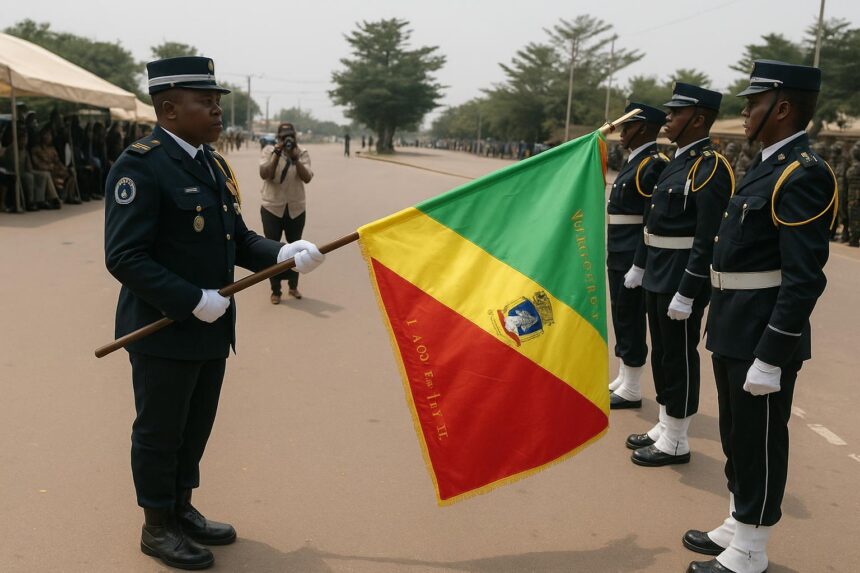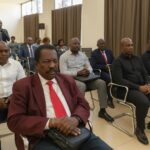Fresh mandate for Colonel Ibengué
Standing on the parade ground of Kinkala, Colonel Pascal Ibengué received the departmental flag and a stream of cameras. In his first words as commander of the Pool gendarmerie, he pledged to ‘tighten the protection net’ across villages still without a permanent brigade.
His promise marks the opening chapter of a leadership transition sealed on 6 September during a formal hand-over with Colonel Rodrigue Mouloungui. The appointment, recorded in decree 2025-298 of 10 July and confirmed by national broadcaster Télé Congo, positions him at the front line of rural security.
A ceremony loaded with symbols
Brigadier-General Gervais Akouangué, head of the national gendarmerie, presided over the parade. He reminded the ranks that ‘merit, assiduity and output’ determine advancement, a sentence that drew crisp salutes from the security and intervention squad, the police company, civil protection units and the Pool military zone.
The ceremony culminated in a disciplined march-past, reviving memories of past national festivities and reassuring local officials gathered around Prefect Philippe Kamba. Loudspeakers carried the military band’s notes over the town’s red-earth streets, underscoring the administration’s desire to restore state authority in the once-restive department.
Security gaps on rural roads
The Pool covers nearly 34,000 square kilometres but counts barely a dozen gendarmerie posts. Long stretches of Route Nationale 1 between Mindouli and Ngoma currently rely on periodic patrols. Villagers told Radio Mucodec that motorcycle theft and petty extortion spike whenever uniformed presence fades after sunset.
Colonel Ibengué said his first field tour will map those ‘white zones’ and prioritise mobile units able to reach them within thirty minutes. He indicated that a small drone section, already tested in the Kouilou, could join operations ‘subject to budget availability’ to monitor bush tracks.
Criteria behind the presidential decree
The reshuffle of regional commanders is framed by the ordinance of 5 February 2001, the 2018 Defence Law and the 2021 Status of Personnel Act. These texts, cited in the presidential decree, seek to professionalise the force while opening promotion channels for officers with proven field experience.
In practice, the criteria mentioned by General Akouangué translate into statistics: response times, solved cases, community mediation sessions and troop discipline reports. Colonel Ibengué previously headed the investigation division in Pointe-Noire, where he led an anti-fuel siphoning task force noted for swift night raids.
What changes residents may feel
Shopkeepers in Kinkala hope the new command will stabilise opening hours. ‘We close at 6 p.m. because lorries avoid the road after dusk,’ explained merchant Thérèse Mpassi. ‘If checkpoints return, wholesalers from Brazzaville might push deliveries later, giving us fresher produce and better margins.’
Teachers posted in Louingui equally welcome the prospect. According to union representative André Ndolo, absenteeism spikes on Mondays when pupils travelling from outlying hamlets fear harassment on footpaths. ‘A visible patrol in the early morning would reassure parents and help us recover lost teaching days,’ he said.
Experts weigh the stakes
Defence analyst Alphonse Foutou of the Centre d’Études Stratégiques thinks the nomination signals a ‘graduated return to normality’ five years after the last sporadic clashes. He notes that the Pool’s proximity to Brazzaville’s power corridors makes security there both a local necessity and a national priority.
Economist Laetitia Ondongo adds a development angle. Freight companies sometimes include a ‘Pool risk’ surcharge of up to 8 % on goods bound for Pointe-Noire. ‘If Colonel Ibengué can document fewer incidents, insurers may cut premiums and food prices could gradually drop along the corridor,’ she argues.
Next steps for the Pool gendarmerie
The new commander intends to convene a security committee with mayors, customary chiefs and youth associations before the end of September. The agenda includes joint night patrols and a hotline using free SMS codes, a model piloted last year in the district of Madingou.
Funding remains the key variable. Although the decree opens the door to redeploying personnel, vehicle upkeep and fuel budgets still depend on quarterly releases. Sources within the prefecture say a memorandum is in preparation to encourage public-private partnerships for street lighting around six strategic junctions.
Colonel Ibengué sums up the mission in practical terms: ‘People must feel this uniform means help, not just fines.’ His words were greeted by ululations from women’s groups lining the parade route, a small but telling sign of the trust he now needs to cultivate.
As the brass band packed away its drums, market sellers rushed back to their stalls, already debating which roads might first see the promised blue-and-white pickups. For many in the Pool, the real verdict on the colonel’s pledge will come with quieter nights and busier mornings.
Regional radio plans to host Colonel Ibengué on an interactive programme next Thursday, inviting listeners to text concerns in real time. Officials hope the on-air dialogue, broadcast on FM 92.3 and streamed on Facebook Live, will anchor the new security agenda in everyday conversation locally.






















